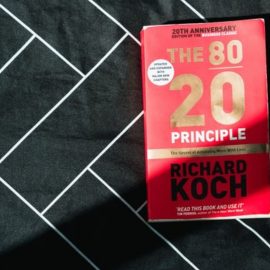

This article is an excerpt from the Shortform book guide to "Poor Charlie's Almanack" by Charles T. Munger. Shortform has the world's best summaries and analyses of books you should be reading.
Like this article? Sign up for a free trial here .
What is the importance of continuous learning to success in life? What is the right way to learn?
The ability of voracious readers to see the world differently and to constantly develop solutions to complex problems affirms the importance of continuous learning. To succeed in life, you need to spend each day trying to be smarter than when you woke up. The best way to learn is to figure things out yourself instead of being spoon-fed information that has been modified to suit the machinations of others.
Read on to discover more about the importance of continuous learning.
Editor’s note: This article is part of Shortform’s guide to team-building. If you like what you read here, there’s plenty more to check out in the guide!
The Importance of Continuous Learning
Munger and Buffett are both famous for their curiosity and their voracious reading.
- “In my whole life, I have known no wise people (over a broad subject matter area) who didn’t read all the time — none, zero. You’d be amazed at how much Warren reads — and at how much I read. My children laugh at me. They think I’m a book with a couple of legs sticking out.”
- Munger’s friends note that he wants to understand everything to a fundamental level, to know what makes something tick.
- “You need to have a passionate interest in why things are happening. That cast of mind, kept over long periods, gradually improves your ability to focus on reality. If you don’t have that cast of mind, you’re destined for failure even if you have a high I.Q.”
- “Curiosity, concentration, perseverance, and self-criticism.”—Einstein
- Spend each day trying to be a little smarter than when you woke up.
Munger emphasizes that the key importance of continuous learning is that it helps us discover new ways to see the world and gains new tools to solve problems with. This can mean discarding his previous favorite ideas.
- “When a better tool (idea or approach) comes along, what could be better than to swap it for your old, less useful tool?”
- “If you want to improve, be content to be thought foolish and stupid.” –Epictetus
Munger is a particular fan of biographies. He likes tying a field’s big ideas to the real people who developed them. You can learn economics better if you think of Adam Smith as your friend.
How to Learn
Simply understanding the importance of continuous learning and spending a lot of time learning won’t produce the best results. Ideally, you optimize how you learn.
Munger believes that the best lessons are learned through figuring things out yourself, not from being spoonfed information.
- “It’s kind of fun for it to be a little complicated. If you want it totally easy and laid out, maybe you should join some cult that claims to provide all the answers. If you figure it out and do the outlining yourself, the ideas will stick better than if you memorize ’em using somebody else’s cram list.”
- People ask Munger often for the secrets to success. He finds this question a sign of a feeble mind and never wants to make it easy for the listener. Instead, people should derive their own tools for success—their checklists and character traits—and train them for the rest of their lives.
- “It is not the possession of truth, but the success which attends the seeking after it, that enriches the seeker and brings happiness to him.”—Max Planck
Interdisciplinary Learning
Alon with Munger’s insistence on the importance of continuous learning, he also emphasizes multidisciplinary learning. He argues that the way fighter pilots are trained is an exemplar for multidisciplinary learning overall. It includes six components:
- He gains a formal education that’s broad enough to cover everything needed in piloting.
- He gains a fluency of knowledge not just to pass academic tests, but to execute flawlessly, even in emergency situations.
- He’s often made to think in forward (what he wants to happen) as well as in reverse (how to avoid the outcomes he doesn’t want.
- He prioritizes his training time by focusing on the most important aspects to minimize damage. These most important aspects are trained to fluency.
- Checklists are mandatory to prevent errors and omissions.
- Even after initial training is complete, continued maintenance is mandatory. He uses the aircraft simulator to prevent atrophy of skills and to remember how to react to rare but critical problems.
Interdisciplinary learning buttresses the importance of continuous learning because it crosses disciplines and calls for unconventional solutions. For example, suppose two old ladies inherit a shoe factory that makes branded shoes and have all sorts of business problems in quality control, supply chain, and management. How do you advise they solve their problem?
- The typical answer is to hear their problems, then write up pages of consultation on how each one can be solved.
- The correct answer is to advise they sell the company, because the problem is way out of their league.
(Shortform note: In a similar problem, in a Stanford MBA class, students were given $10 and told to maximize profits from it, then present for 10 minutes on what they did. Many students thought literally about the problem, using the $10 to buy cheap goods like water bottles and to resell them. Some clever students realized that the real value of their project was their time, which they sold by standing in line at restaurants and such. The winning team sold the 10 minute slot to a company who wanted to hire MBAs.
These problems might be solved by inverting the problem. For the two old ladies, how would you maximize the value to them at the end of the day? For the MBA problem, what are all the assets that you have available, and what can you do with them? What if you had $0 instead of $10?)

———End of Preview———
Like what you just read? Read the rest of the world's best book summary and analysis of Charles T. Munger's "Poor Charlie's Almanack" at Shortform .
Here's what you'll find in our full Poor Charlie's Almanack summary :
- A collection of Charlie Munger’s best advice given over 30 years
- Why you need to know what you’re good at and what you’re bad at to make decisions
- Descriptions of the 25 psychological biases that distort how you see the world






